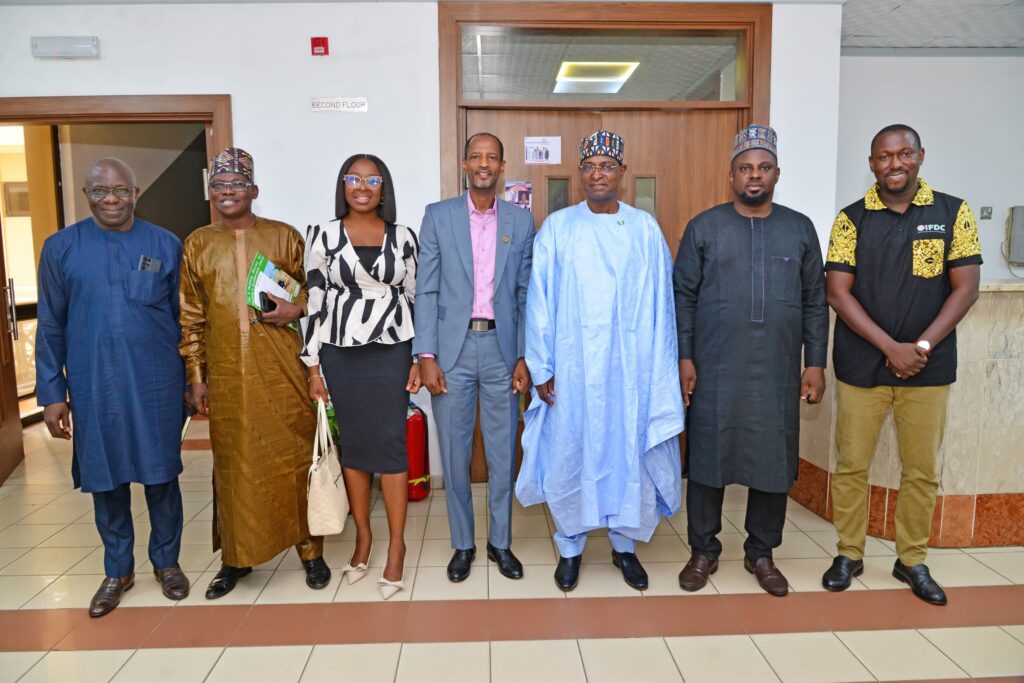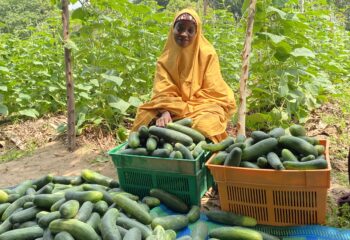
On April 23 in Abuja, Nigeria, IFDC reaffirmed its commitment to strengthening Nigeria’s dairy and livestock sectors through innovation and strategic partnerships during a courtesy visit to the Honorable Alhaji Idi Mukhtar Maiha, Federal Minister of Livestock Development.
The meeting marks over a decade of IFDC’s interventions and impact across Nigeria’s livestock and horticulture value chains.
Led by Yusuf Dramani, Country Director of Nigeria, the IFDC delegation included Mohammed Salasi Idris, HortiNigeria Program Director; Mohammed Zailani, Dairy Team Lead; Nassourou Diallo, Soil Values Broker Lead; Feyikemi Adurogbangba, HortiNigeria Communication Coordinator; and Dr. Celestine Ayok, Dairy Consultant.
“Our aim is to empower farming communities through inclusive brokering, sustainable practices, and strong value chain linkages.”
Nassourou Diallo, Soil Values Broker Lead
Minister Maiha warmly welcomed the team, attesting that IFDC’s work fully aligns with the Ministry’s priorities.
“Roll up your sleeves—there is a lot of work to be done to revitalize the over 400 grazing reserves in Nigeria,” he said, noting that feed and fodder production, skills development, and pasture management would reduce conflicts, particularly in the Middle Belt.
During the visit, the delegation presented IFDC’s work in Nigeria’s dairy sector since 2012, including feed and fodder development, and explained the critical role solar-powered irrigation technologies and the double cropping, dual income approach are playing in diversifying herders’ income and improving their livelihoods.
Additionally, IFDC is further expanding its work in Nigeria’s dairy sector, supporting inclusive growth and long-term resilience through the Value4Dairy project, a strategic initiative designed to strengthen Nigeria’s dairy industry by improving production efficiency, supporting cooperative models, and increasing market access.
During the meeting, Zailani discussed IFDC’s partnerships with major multinational companies, including FrieslandCampina WAMCO, Danone, and Nestlé, to boost local milk production. He emphasized how these collaborations have improved the livelihoods of the households supplying milk to these companies, aligning with IFDC’s vision of empowering women through cooperative models.
Salasi Idris advocated for expanding income sources and improving nutrition through vegetable production training for pastoralists.
“Backyard vegetable farming and seedling production offer practical entry points for diversifying income, especially for women, while enhancing family nutrition,” he said.
Similarly, Diallo outlined plans to work with pastoralist communities within the Soil Values program intervention areas.
“Our aim is to empower farming communities through inclusive brokering, sustainable practices, and strong value chain linkages,” he noted.
According to Dramani, the meeting underscored the shared vision between IFDC and the Ministry: “We are committed to lifting pastoralists out of poverty by helping them achieve sustainable income year-round. Our work goes beyond development—it’s about building resilience and promoting peace.”
With a focus on resilience, productivity, and peacebuilding, this partnership is poised to drive meaningful change for the dairy sector and empower pastoralists across Nigeria.




